News
December 2019
GROUP WORK HIGHLIGHTED IN CHEMISTRY WORLD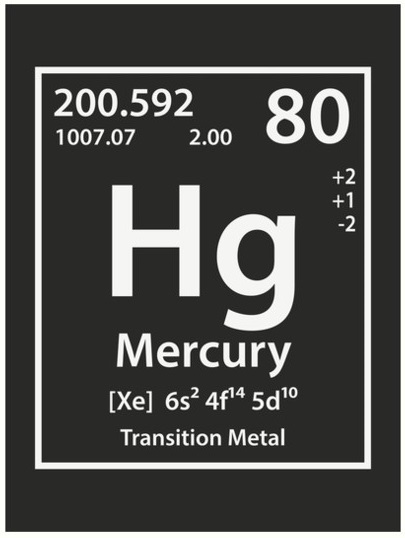 Chemistry World, the popular monthly news magazine of the Royal Society of Chemistry has highlighted the work of Minjun (Jake) Yang and Bertold Rasche in an article entitled 'Intense Sound Fields Make Mercury React With Water'
Chemistry World, the popular monthly news magazine of the Royal Society of Chemistry has highlighted the work of Minjun (Jake) Yang and Bertold Rasche in an article entitled 'Intense Sound Fields Make Mercury React With Water'
https://www.chemistryworld.com/news/intense-sound-fields-make-mercury-react-with-water/4010873.article
Sepember 2019
ZIMMER AND PEACOCK LICENCE COMPTON GROUP BACTERIA SENSOR
Zimmer and Peacock have licenced the electrochemical bacteria sensor developed by Sabine Kuss during her Marie Curie Fellowship 2016-2018
Oxford University Innovation licenses sensors for bacterial sensing in food and water to Zimmer and Peacock.
Point of measurement devices which can accurately detect and quantify the levels of bacteria in food and water forms the basis of a new licensing deal between Oxford University Innovation (OUI), the research commercialisation arm of Oxford University, and electrochemical sensor manufacturer Zimmer and Peacock (ZP).
The sensors were developed by Professor Richard Compton and Dr Sabine Kuss a Marie Curie Fellow in Oxford’s Department of Chemistry; the Compton Group having a long history of developing commercial electrochemical sensors. ZP will develop palm-sized devices to utilise electrochemical sensing to analyse a liquid sample, in a similar way to blood sugar monitoring, and delivers results to a smartphone in 30 minutes.
The Compton Group and ZP deal builds on a pre-existing relationship following the prior licensing of several technologies in the food market.
Dr Martin Peacock and Mr. Even Zimmer, the founders of Zimmer and Peacock, said: “It’s great to be able to use our capabilities to develop this new technology from Richard’s lab. We will be developing and marketing this technology to enable customers to make their own detection of quantification of bacteria in food and water. Electrochemical sensors are well suited to compact electronics that can be coupled to smartphones to give a simple numerical reading. This will change an industry, which is currently waiting for 3 days to know whether their products have pathogen contamination"
Prof Compton added: “I am looking forward to working with Even and Martin’s team at ZP to further develop these sensors from my group. They understand the science, the market, and have an impressively dynamic and proactive approach.”
Dr Kuss continues: “We know that ZP are determined to make products that are easy to use and will help to keep the public safe from water and food borne illnesses.”
Dr Jamie Ferguson at Oxford University Innovation, added: “We have a longstanding relationship with ZP and have seen success together on several food sensors. ZP bring a wealth of experience in developing the microfluidics and electronics to bring this latest development from the Compton Group to market. I look forward to hearing how the customers trials progress. We know that ZP will ensure that this technology becomes a solution that customers want to use.”
Sepember 2019
VISIT BY RGC TO HUNAN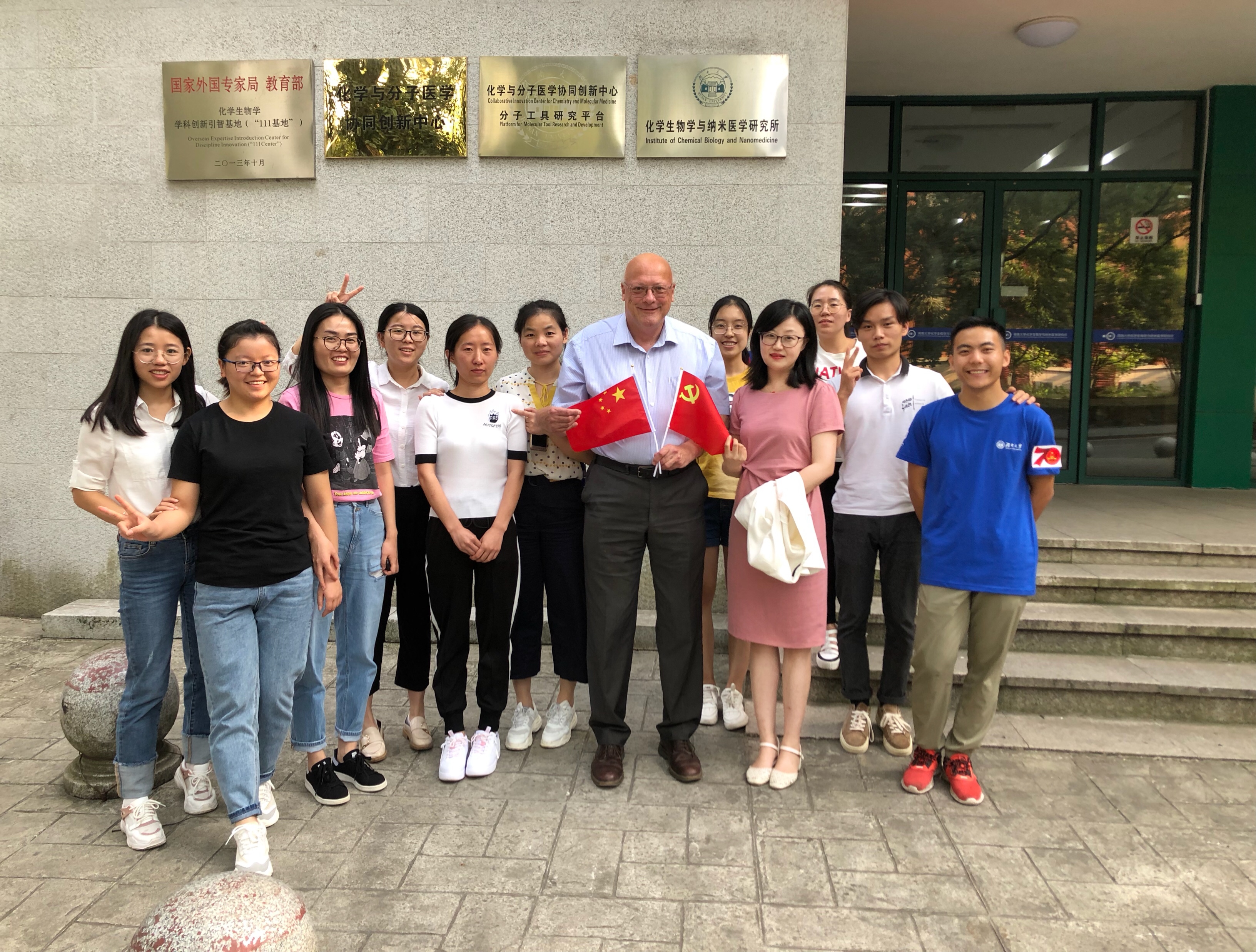
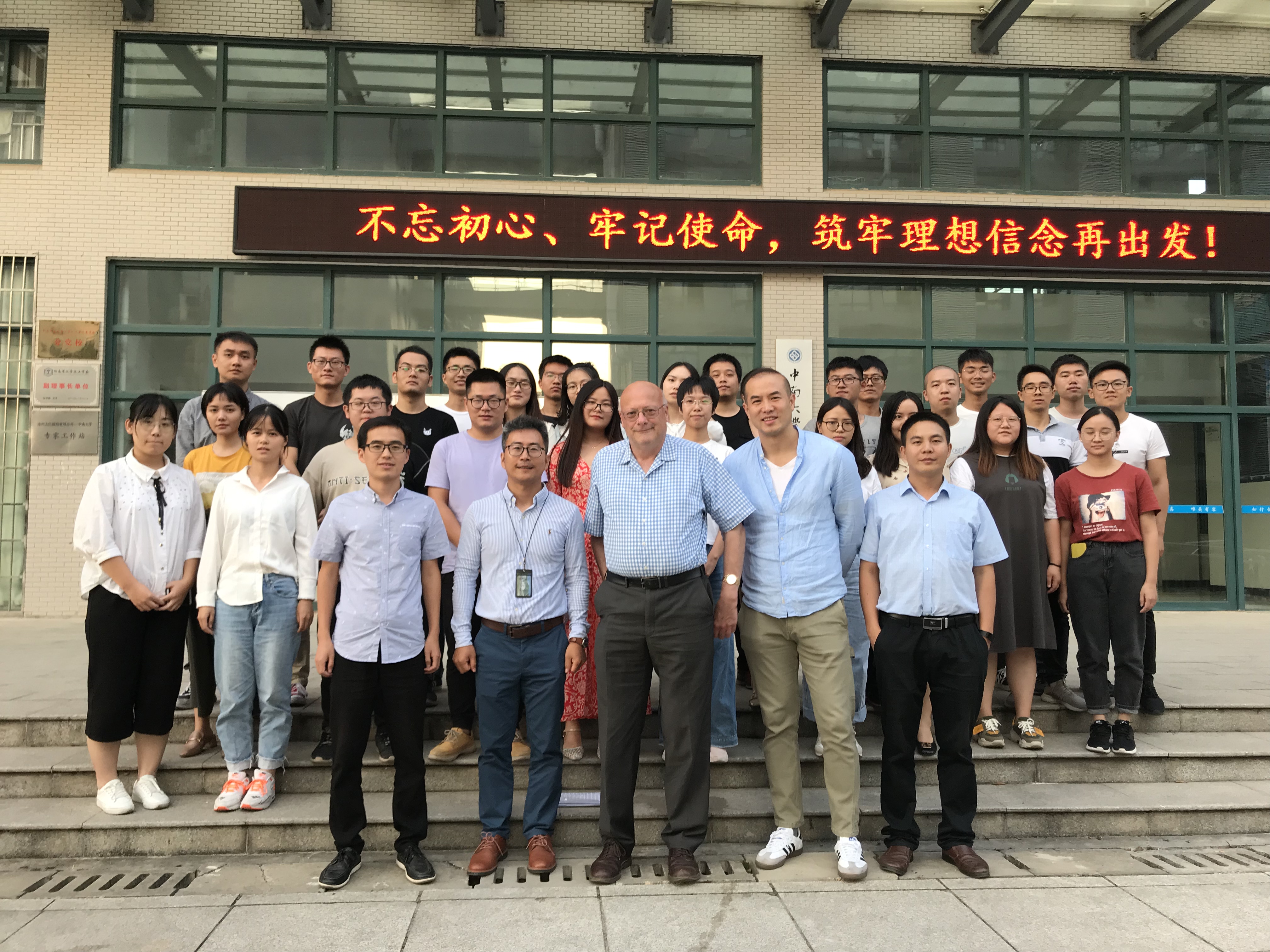
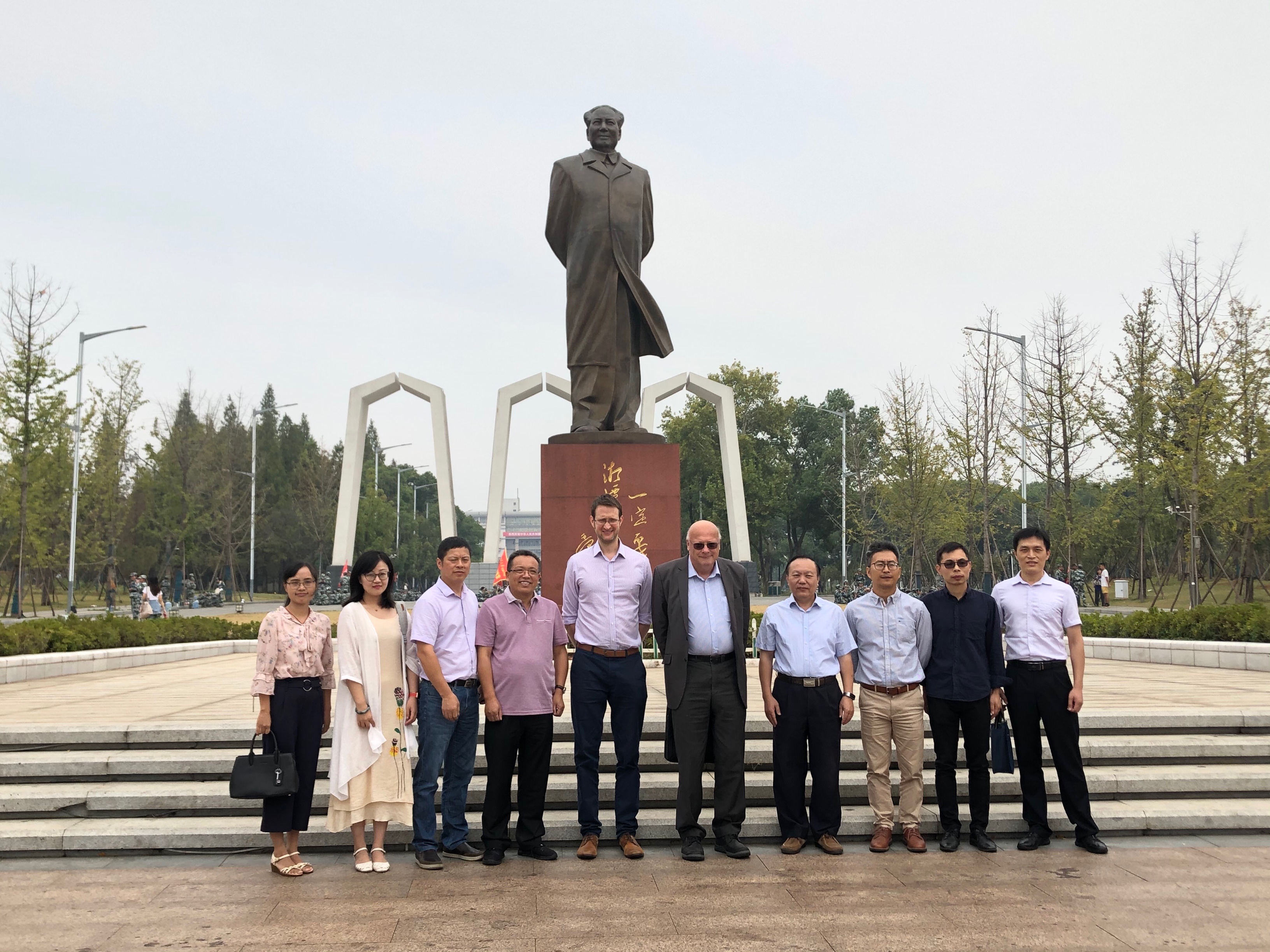 RGC visited former group members Professor Yige Zhou (Hunan University) and Professor Xiaobo Ji (Central South University) in Changsha, Hunan between September 21st and 26th. He gave lectures on the electrochemistry of nanoparticles in both universities as well as in Xiangtan University (host Professor Xianyu Wang). He was much impressed by the research of his former students and the enthusiasm and quality of their teams!
RGC visited former group members Professor Yige Zhou (Hunan University) and Professor Xiaobo Ji (Central South University) in Changsha, Hunan between September 21st and 26th. He gave lectures on the electrochemistry of nanoparticles in both universities as well as in Xiangtan University (host Professor Xianyu Wang). He was much impressed by the research of his former students and the enthusiasm and quality of their teams!
Left photo - Hunan University; middle - Central South University; right - Xiangtan University.
Sepember 2019
VIP PAPER IN ANGEWANDTE CHEMIE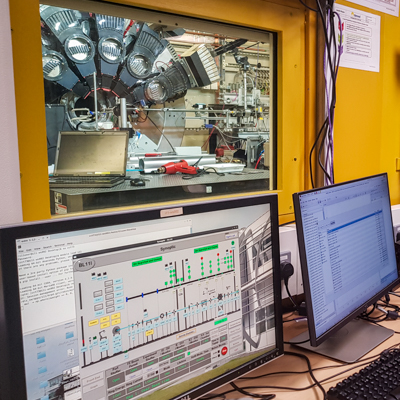
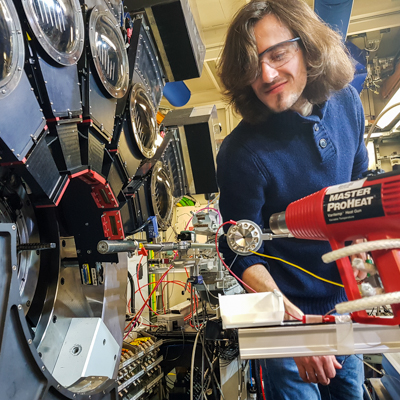
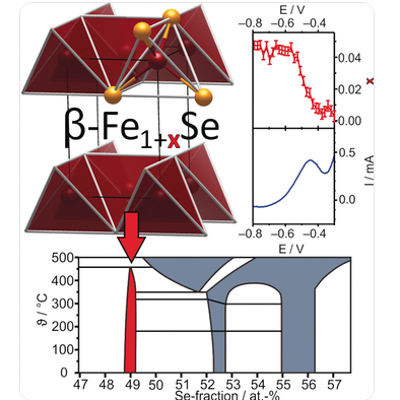 A new paper by DFG Fellow Dr Bertold Rasche and researchers from the Compton and Clarke groups in cooperation with the DIAMOND synchrotron has been published as a VIP Communication in Angewandte Chemie. The paper reports the precise, post-synthetic electrochemical control of the composition of an iron-based superconductor, with simultaneous tracking of the crystal structure by means of in-situ synchrotron X-ray diffraction. While the superconductivity is shown to be independent of the compositional changes in contrast to earlier reports, further in-situ experiments reveal how minor traces of oxygen destroy the superconducting properties. The latter process can be reversed electrochemically. The work demonstrates the exquisite control afforded by electrochemistry in comparison to classical approaches to chemical synthesis.
A new paper by DFG Fellow Dr Bertold Rasche and researchers from the Compton and Clarke groups in cooperation with the DIAMOND synchrotron has been published as a VIP Communication in Angewandte Chemie. The paper reports the precise, post-synthetic electrochemical control of the composition of an iron-based superconductor, with simultaneous tracking of the crystal structure by means of in-situ synchrotron X-ray diffraction. While the superconductivity is shown to be independent of the compositional changes in contrast to earlier reports, further in-situ experiments reveal how minor traces of oxygen destroy the superconducting properties. The latter process can be reversed electrochemically. The work demonstrates the exquisite control afforded by electrochemistry in comparison to classical approaches to chemical synthesis.
August 2019
HOT ARTICLE IN ANGEWANDTE CHEMIE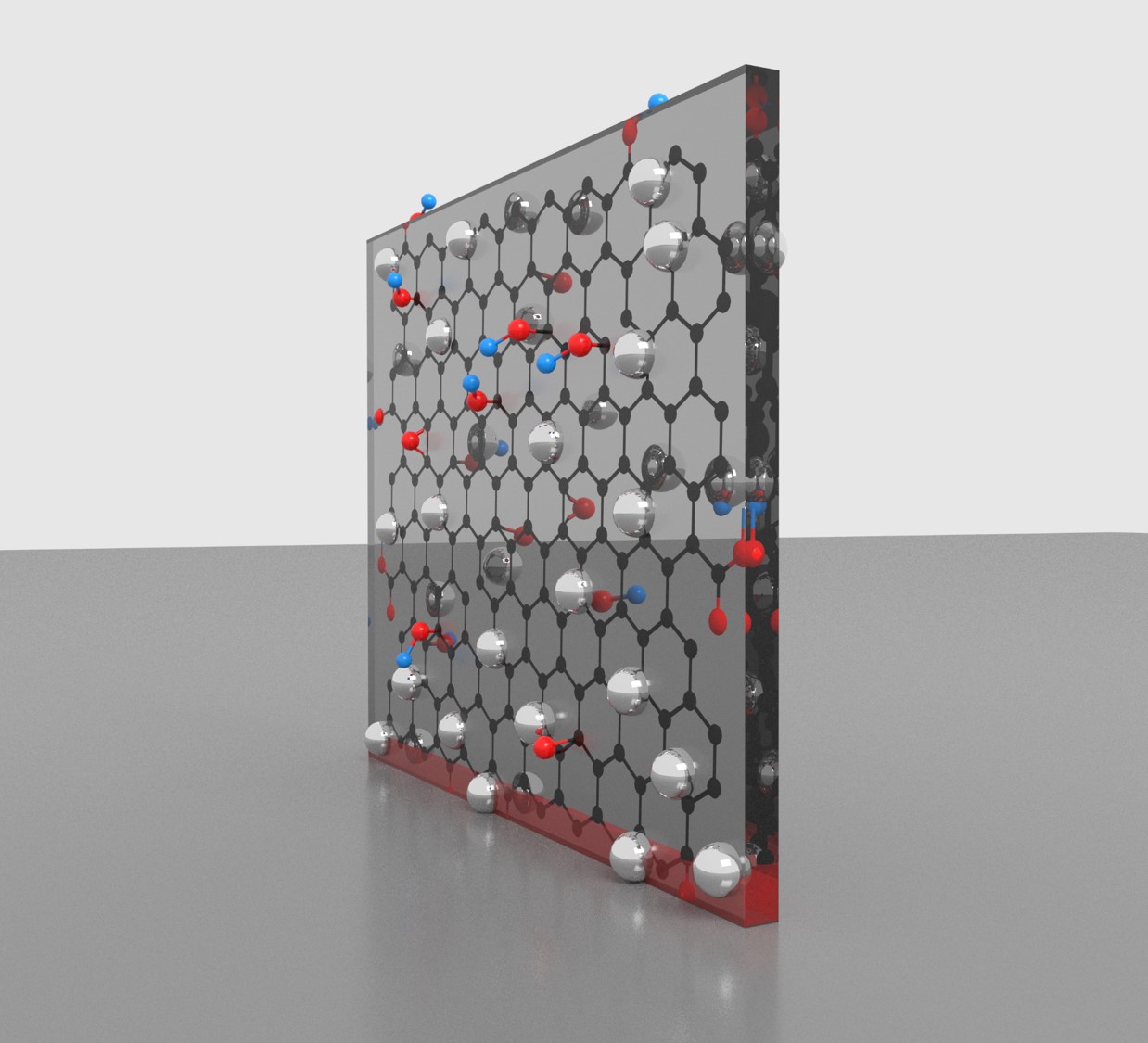 The work of Ruiyang Miao and Lifu Chen, in collaboration with Professor Lidong Shao (Shanghai), has been published as a hot article entitled "Electron Transfer to Decorated Graphene Oxide Particles"
in the prestigious Angewandte Chemie journal. See https://doi.org/10.1002/anie.201907393.
The paper notes that Graphene oxides (GOs) are popular catalyst supports for precious metals in nanoparticle form and investigates the hydrogen oxidation reaction (HOR)
and the hydrogen evolution reaction (HER) on individual GO platelets decorated with Pd nanoparticles (Pd/GOs).
The results reveal that the catalytic activity is confined to the zone physically close to the point of electrical contact between platelet and electrode with just a fraction of the platelet active.
The work of Ruiyang Miao and Lifu Chen, in collaboration with Professor Lidong Shao (Shanghai), has been published as a hot article entitled "Electron Transfer to Decorated Graphene Oxide Particles"
in the prestigious Angewandte Chemie journal. See https://doi.org/10.1002/anie.201907393.
The paper notes that Graphene oxides (GOs) are popular catalyst supports for precious metals in nanoparticle form and investigates the hydrogen oxidation reaction (HOR)
and the hydrogen evolution reaction (HER) on individual GO platelets decorated with Pd nanoparticles (Pd/GOs).
The results reveal that the catalytic activity is confined to the zone physically close to the point of electrical contact between platelet and electrode with just a fraction of the platelet active.
June 2019
KAMONWAD NGAMCHUEA DELIVERS 2018 RONALD BELCHER PRIZE LECTURE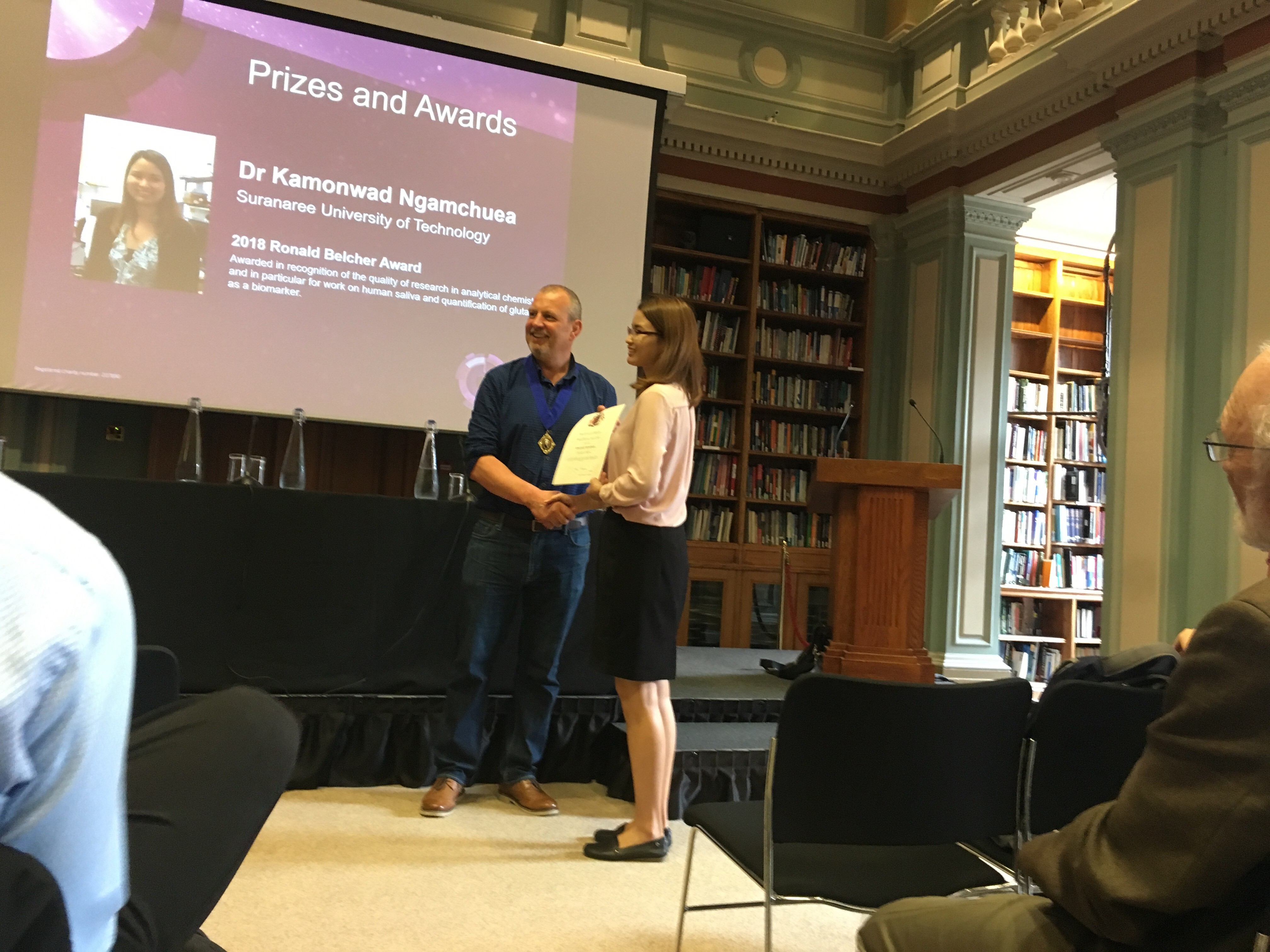
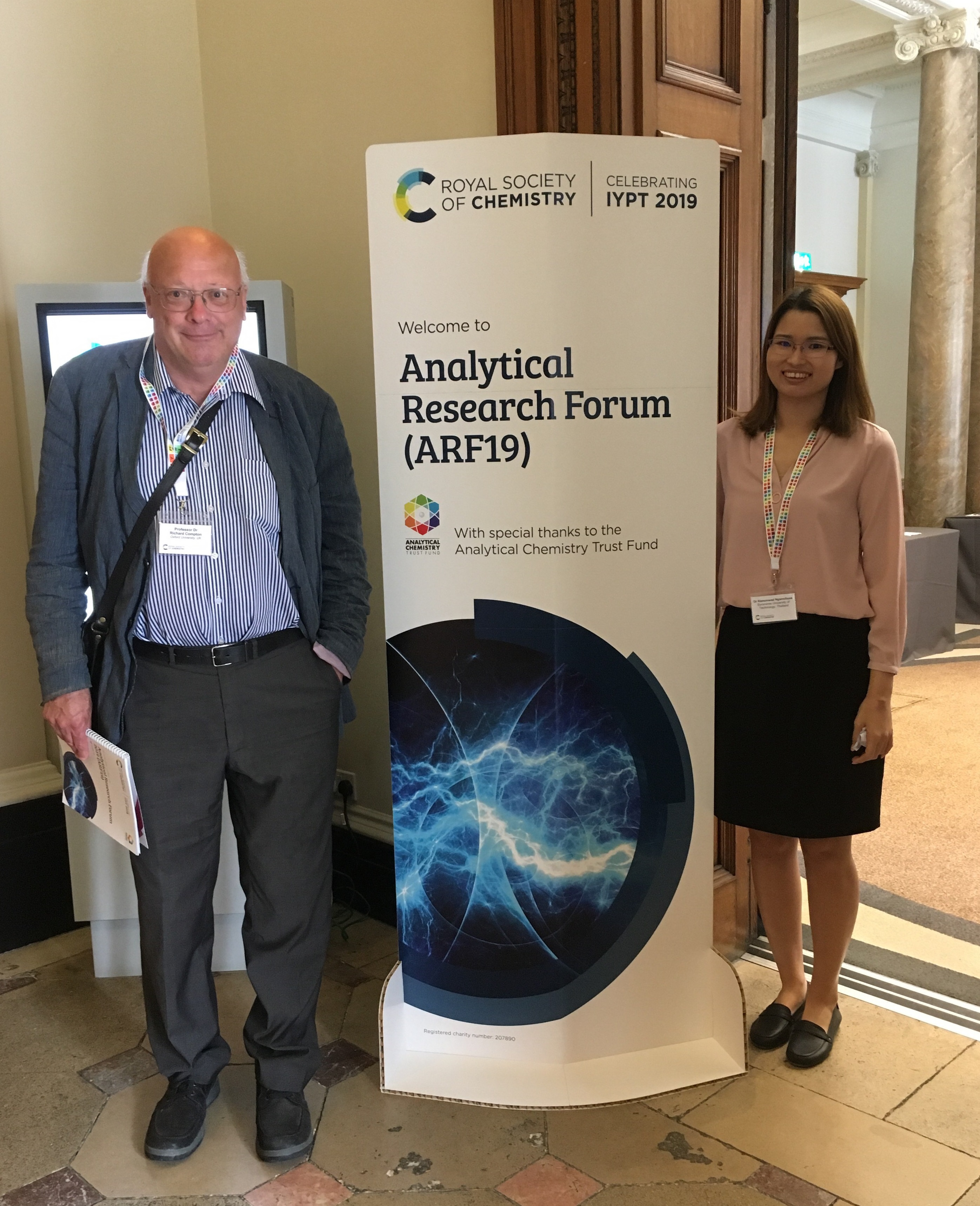 Dr Kamonwad Ngamchuea received her 2018 Ronald Belcher Prize from Professor Duncan Graham, Chair of the Analytical Division at the Analytical Research Forum 2019 held at the Royal Society of Chemistry, London, June 25th 2019. Her lecture was entitled "Chemical analysis of glutathione: A potential biomarker for bipolar disorder"
Dr Kamonwad Ngamchuea received her 2018 Ronald Belcher Prize from Professor Duncan Graham, Chair of the Analytical Division at the Analytical Research Forum 2019 held at the Royal Society of Chemistry, London, June 25th 2019. Her lecture was entitled "Chemical analysis of glutathione: A potential biomarker for bipolar disorder"
January 2019
Two 'hot' articles in PCCP
The RSC journal PhysChemChemPhys has included two of our papers in its collection of HOT articles for 2018: Simultaneous Activity and Surface Area Measurements on Single Mesoporous Nanoparticle Aggregates, DOI: 10.1039/C8CP04954H (Xue Jiao and Chris Batchelor-McAuley) and Electrochemical Characterisation and Comparison of Transport in Nafion Films and Particles, DOI: 10.1039/C8CP06504G (Chuhing Lin and Lifu Chen)
https://goo.gl/NSMUPk
January 2019
Financial Times Letter: Oxford - China Science
The Financial Times has published (January 24th, 2019) a letter from Professor Peter Edwards and RGC pointed out the strength of Oxford - China science:
https://www.ft.com/content/d612dc76-1f0f-11e9-b126-46fc3ad87c65


